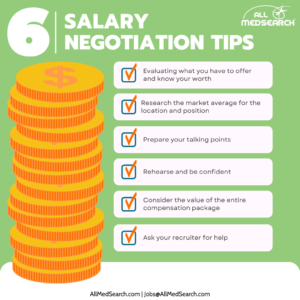
Do you need help on how to negotiate your salary during onboarding? Are you unsure if you are going to be compensated appropriately for your skills?
According to Glassdoor, 59% of employees accepted the salary they were first offered, and did not negotiate their salaries.
However, if you don’t feel the pay aligns with your education, career level, skill set and experience, you may choose to negotiate for more money. For the majority of positions people apply to, hiring managers expect their candidates to negotiate their salary and benefits.
Even though the idea of salary negotiation can seem like a daunting task, we will help walk you through our best tips on how to negotiate.
Tip 1: Evaluate What You Have to Offer and Know Your Worth
It is important you know exactly how much value you can offer a potential employer before you begin the process of negotiating your salary. There are several factors that can influence your compensation package, such as:
- Location:
- Consider the cost of living for your area. A job in San Francisco will pay more than the same job in Dallas.
- Your Industry Experience Level:
- If the job description requires 3-5 years of experience and you meet the higher requirement, it might warrant a higher salary.
- Education Level:
- Relevant bachelor’s or master’s degrees might impact your compensation package depending on the role.
- Skills:
- Niche or technical skills that take time to master may help you attract higher salaries.
Tip 2: Research the Market Average for the Location and Position
Knowing the market average can give you a baseline to know how much you should be looking for and can even be used as justification for why you deserve more. A great place to search for national averages is BLS.gov
Another good thing to see what the averages in your specific area are by looking at other employers job openings online.
Tip 3: Prepare Talking Points
As you are preparing your reasons for asking for a higher compensation package, it might be helpful to use the following question as a framework for your conversation: Why do you feel you deserve a higher salary than the one you are being offered?
Put together a few talking points before you contact the employer and try to be as specific as possible. Some points of what to talk about are:
-
Results you’ve achieved in previous roles – If possible use numbers and figures to further prove your point.
- Example: If you reached or exceeded goals in your previous role, if you’ve earned awards, etc.
-
Special skills or certifications
-
Especially if they are in high demand within your industry.
-
-
Average salaries being offered by other employers for similar roles
Tip 4: Schedule a Time to Discuss
Reach out to the hiring manager to set up a time to speak over the phone or in person.
While you can to negotiate over email, we would recommend for the conversation to happen over the phone or in person. Speaking over the phone or in-person allows you to have a back-and-forth conversation, express gratitude and clearly communicate your requirements.
You should try make your negotiation feel like a part of an open dialogue between you and your potential new employer—not a list of demands.
Tip 5: Rehearse and Be Confident
Practicing with a close friend or family member can help you work out any areas that need improvement.
Talking about money can sometimes feel uncomfortable, but the more you practice, the more comfortable and confident you will feel when it comes time to have the conversation.
Tip 6: Be Flexible and Consider the Value of the Entire Compensation Package
Even if the employer is unable to provide you a higher salary, they may be able to offer other forms of compensation. For example, you may be able to negotiate more stock options, extra vacation days, a sign-on bonus, etc.
Be ready to ask for alternatives in a situation where the employer immediately lets you know they cannot increase the salary offer. The total of the compensation package might be worth the same, if not more, as a higher salary.
Tip 7: Ask Your All Med Search Recruiter for Help
Your All Med Search Recruiter can help provide you with talking points and average salaries. In some cases, we can also help get you a higher sign-on, salary, or relocation package.
Tip 8: Plan your Negotiation for a Thursday
According to Psychology Today, the best day of the week to ask for a raise or salary negotiations is Thursday. People tend to become more flexible and accommodating as the work week comes to a close.
Our recruiters offer tons of resources to help you throughout your job search. Talk to us today to find you a job that will help you achieve the next step in your career goals. Jobs@AllMedSeach.com or 858-509-1464
